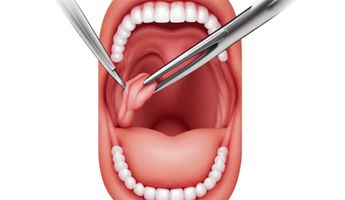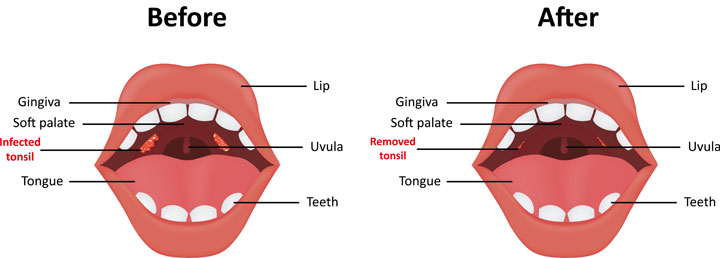Tonsillectomy in Paris
Search and Compare the Best Clinics and Doctors at the Lowest Prices for Tonsillectomy in Paris

Find the best clinics for Tonsillectomy in Paris
No pricing info available
From 161 verified reviews
latifa Rabhi, 06 September 2020
Very fast support, with highly qualified and human staff.The rooms are beautiful and very quiet.Calm and gentleness in this hospital, I highly recommend.
WHY US?
At Medijump, we're making medical easy. You can search, compare, discuss, and book your medical all in one place. We open the door to the best medical providers worldwide, saving you time and energy along the way, and it's all for FREE, no hidden fees, and no price markups guaranteed. So what are you waiting for?

Free

Best Price

Widest Selection

Risk-Free
What you need to know about Tonsillectomy in Paris

Tonsillectomy is a surgical procedure to remove the tonsils – the two oval-shaped pads of tissue located at the back of the throat. The procedure is usually performed to treat recurring or chronic inflammation and infection of the tonsils (known as tonsillitis), but it can also be done to treat breathing problems related to swollen tonsils, sleep apnea, cancer of the tonsils, bleeding of the tonsils, as well as frequent and loud snoring.
What does a Tonsillectomy Procedure Involve?
Tonsillectomy is performed under general anesthetic, so you will not feel any pain during the surgery. There are two ways to perform a tonsillectomy. The most common way is to use a blade or scalpel to cut out the tonsils. The other way is to use a specialized surgical tool that uses soundwaves, or high-powered energy heat to destroy or remove the tissues and stop any bleeding.
How Long Should I Stay in Paris for a Tonsillectomy Procedure?
Unless there is a complication that occurs after the surgery, you should be able to leave the hospital on the same day. However, plan to stay in Paris for about 5 to 10 days for initial recovery and follow-up hospital checkups as your surgeon will monitor the healing progress.
What's the Recovery Time for Tonsillectomy Procedures in Paris?
The total recovery period can take about two weeks, but most people are able to go back to work or school and resume most of their normal routine within 5-7 days. Avoid any strenuous activities, such as intense exercise and heavy lifting for a few weeks following the surgery to avoid any complications. Your surgeon will give you a detailed recovery timeline for you.
What sort of Aftercare is Required for Tonsillectomy Procedures in Paris?
Make sure to take pain medications as prescribed by your surgeon and drink plenty of water to avoid dehydration. You may need to avoid hard, crunchy, acidic, or spicy foods for a while, and your surgeon may give you a dietary plan. Talk to your surgeon about any activities that you need to avoid to prevent tonsillitis from recurring.
What's the Success Rate of Tonsillectomy Procedures in Paris?
Tonsillectomy is generally safe and highly successful. The morbidity rates of the procedure range from 1.5% to 1.4%. However, like other types of surgeries, there are side effects and risks that you should not overlook, including swelling, bleeding during healing, bleeding during surgery, reactions to anesthetics, infection, and sore throat.
Are there Alternatives to Tonsillectomy Procedures in Paris?
In some cases, tonsillitis that is not severe and only happened once does not need a tonsillectomy. For other conditions, your alternative depends on the disease you used the procedure for. For instance, if you have sleep apnea, your doctor may suggest you undergo nasal surgery, tongue surgery, or bone surgery. If you need to undergo the procedure because of cancer, your doctor may recommend chemotherapy, immunotherapy, and radiation therapy.
What Should You Expect Before and After the Procedure
Having a problem in your tonsils can be uncomfortable, causes painful symptoms, and it can also lead to other dangerous complications. After the procedure, all of your symptoms should be relieved and your risk of dangerous complications is significantly reduced.
Whilst the information presented here has been accurately sourced and verified by a medical professional for its accuracy, it is still advised to consult with your doctor before pursuing a medical treatment at one of the listed medical providers
No Time?
Tell us what you're looking for and we'll reachout to the top clinics all at once
Enquire Now

Popular Procedures in Paris
Prices Start From $8,031

Prices Start From $404

Prices Start From $18

Recommended Medical Centers in Paris for Tonsillectomy

- Interpreter services
- Translation service
- Religious facilities
- Medical records transfer
- Medical travel insurance
- Health insurance coordination
- TV in the room
- Safe in the room
- Phone in the room
- Private rooms for patients available

- Interpreter services
- Translation service
- Religious facilities
- Medical records transfer
- Medical travel insurance
- Health insurance coordination
- TV in the room
- Safe in the room
- Phone in the room
- Private rooms for patients available

- Interpreter services
- Translation service
- Religious facilities
- Medical records transfer
- Medical travel insurance
- Health insurance coordination
- TV in the room
- Safe in the room
- Phone in the room
- Private rooms for patients available
Tonsillectomy in and around Paris
About Paris
Paris is the capital and most populous city of France and it is the second-most visited country in the world and it is easy to see why. The city is considered as an international center of fashion, culture, art, and gastronomy. Its boulevards are lined with museums, world-famous monuments, classical bistros and boutiques, wine bars, and design shops that successfully captured the heart of its visitors. Besides a popular destination for leisure, Paris is also one of the leaders in Europe for medical tourism. Hospitals and clinics in the city are well-equipped and are able to perform all manner of medical treatments for international tourists. The doctors and nurses offer the highest level of care that is hard to rival.
Popular Parts of Paris
Paris is filled with iconic monuments with thousands of years of history. The most popular attraction of the city, as well as France’s symbol, is the Eiffel Tower. Visitors are allowed to climb as far as the 2nd floor via the south pillar’s 720 stairs or ride the elevator to the top. Besides the Eiffel Tower, visitors can stroll around the glamorous avenue des Champs-Élysées and admire Arc De Triomphe, admire the exquisite décor of Sainte-Chapelle, wander along the Seine, or try the city’s art nouveau cafes. Visiting Paris will never be complete without exploring its museums. One of the most popular is the Louvre, which is the biggest museum in the world with thousands of famous works, including the Mona Lisa.
Transport in Paris
Paris Charles de Gaulle Airport is the main international gateway to the city. It connects the city with almost every country around the world. Getting around Paris is easy as the city boasts one of the most efficient public transportation systems in the world. The metro subway system is extensive, generally safe, easy to use, and the trains usually arrive on time. The buses are spacious and affordable. There is also a commuter express (“RER”) train service that will take you to the city’s most important areas. Taxis are available and can be found easily.
Visas in Paris
France is a member of the Schengen Agreement, meaning citizens of 62 countries, including Singapore, the US, and Australia do not need a visa to enter and stay in the country for up to 90 days. Other nationals not listed in the visa-free entry should obtain and apply for a visa and always check at the nearest French embassy or consulate for the requirements.
Weather in Paris
Spring (March-May) has mild temperatures with a lot of rainy days. Summer starts in June bringing warm temperatures and sunny days. The average temperature during the summer is around 18°C. The temperature will slowly decrease in autumn (September – November), but the weather is still generally pleasant. Winter can be cold as the temperature drop to 4°C.
Additional Info
- Local Currency: The official currency is the euro. 1 EUR is approx. 1.12 USD.
- Money & Payments: ATMs are widely available. Debit and credit cards are accepted almost everywhere. Tipping can be mandatory in certain places.
- Local Language: French is the official language, but many people in tourist areas speak English.
- Local Culture and Religion: Paris has a diverse religion, with Christianity as the biggest. Other religions, such as Islam, Buddhism, and Judaism, are present.
- Public Holidays: Paris celebrates 11 official public holidays, including New Year’s Day, Easter Monday, Bastille Day, and Christmas Day.
Popular Searches
- Plastic Surgery in Thailand
- Dental Implants in Thailand
- Hair Transplant in Thailand
- Breast Augmentation Thailand
- Gastric Sleeve in Thailand
- Gender Reassignment Surgery in Thailand
- Laser Hair Removal in Bangkok
- Botox in Bangkok
- Dermatology in Bangkok
- Breast Augmentation in Bangkok
- Coolsculpting in Bangkok
- Veneers in Turkey
- Hair Transplant in Turkey
- Rhinoplasty in Turkey
- Stem Cell Therapy in Mexico
- Rhinoplasty in Mexico
- Liposuction in Mexico
- Coolsculpting in Tijuana
- Rhinoplasty in Korea
- Scar Removal in Korea
- Gastric Sleeve in Turkey
- Bone Marrow Transplant in India
- Invisalign in Malaysia
- Plastic Surgery in the Dominican Republic
- Tummy Tuck in the Dominican Republic
- Plastic and Cosmetic Surgery in Poland
- Rhinoplasty in Poland
- Hair Implant in Poland
- Dental Implants in Poland
- IVF in Turkey
